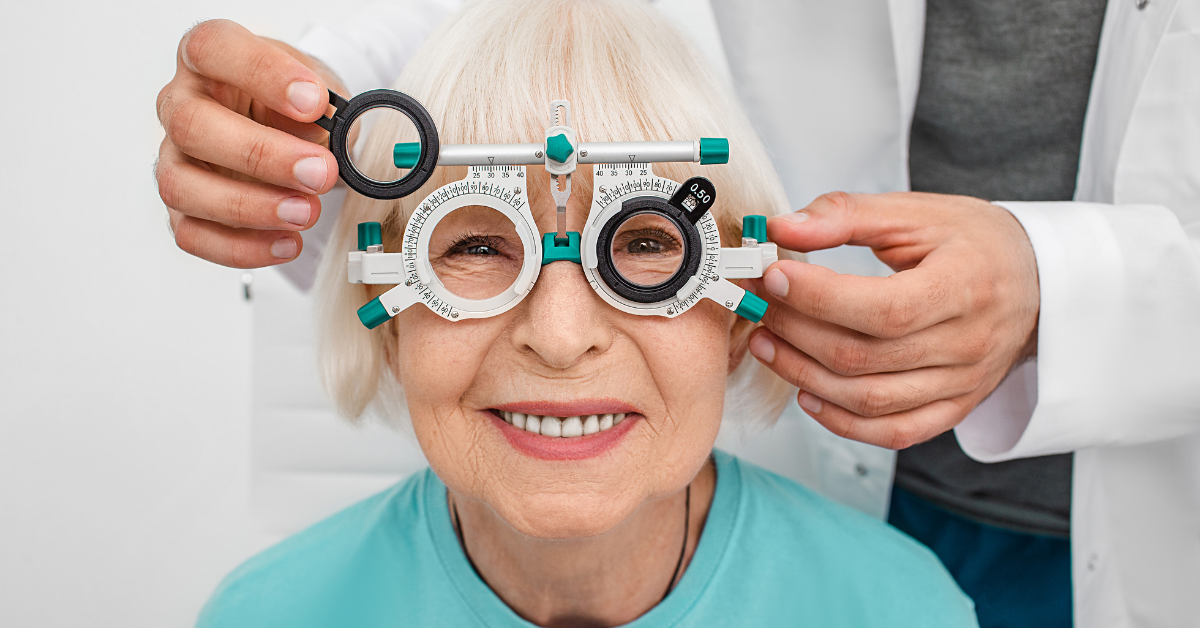May is Healthy Vision Month. Yes, it seems as though there’s a month (or a day) for just about everything, doesn’t it? But when it comes to our health, having these gentle reminders to pay attention can be helpful. After all, the more we do to protect our health now, the more likely it is that we’ll be able to enjoy a good quality of life later, right? In this post, we’ll share some tips you can take advantage of right away to ensure that your peepers keep peering and perusing as perfectly as possible.
Some Eye Conditions Are Age-Related.
You’ve no doubt heard of—and may know people who have—cataracts, glaucoma, and macular degeneration. All of these eye conditions are more likely to occur as we get older. However, that doesn’t mean we’re destined to develop any of them. Family history makes some people more predisposed than others to develop these problems as they age.
If you get your eyes examined regularly, your eye doctor can detect these and other eye conditions early, when treatment is most effective. And even if your genetic makeup places you at higher risk for any of these eye problems, you can still take steps to ward them off, or potentially slow their progression if you already have one or more of them.
Presbyopia
According to the National Institute on Aging, several other eye conditions affect far more people as they get older. One is presbyopia, which is the gradual loss of the eye’s ability to focus on objects that are close by or read the small print. Fortunately, reading glasses, prescription glasses or contact lenses can often remedy this problem, at least to some extent. In some cases, intraocular lenses or LASIK surgery might be needed (or preferred) to correct presbyopia.
Dry Eye
Another common eye problem among older adults, and frequently among younger adults, is dry eye. The American Academy of Ophthalmology explains dry eye as occurring when the tears you normally produce don’t sufficiently lubricate your eyes when you blink. This may occur because there aren’t enough tears or because they’re of poor quality. It can cause discomfort and redness. Many types of eye drops are available to treat dry eye. Though, it’s always a good idea to check with your eye doctor before self-treating.
Sometimes dry eye is a symptom of an underlying disease, such as rheumatoid arthritis or thyroid disease. Additionally, certain prescription medications can also cause dry eye. If lubricating eye drops don’t do the trick, there are other options your eye doctor might recommend. This includes inserting tiny silicone plugs into your tear ducts to keep your natural tears in your eyes longer or surgically closing your tear ducts.
Floaters
Floaters are yet another eye condition that affects many people as they get older. These appear as tiny specks that seem to float across your field of vision. You’re most likely to notice them while you’re in a brightly lit place or in sunlight. While they can be annoying, they typically are nothing to worry about. However, if you suddenly see a lot of them and/or they’re accompanied by flashes of light, that could be a sign of something more serious, like retinal detachment. If you experience something like this, you should get medical help immediately.
Aging can also bring on problems with the eyelids. Examples include redness, swelling, itching and crusting or flaking that occurs during sleep. Various diseases and health conditions can cause these symptoms. These include blepharitis, which is often easily treated with a gentle, careful cleansing routine and warm compresses. Your eye doctor can help you determine what’s causing the problem and how best to treat it.
Steps You Can Take To ‘Observe’ Healthy Vision Month
You may have put off having your eyes checked for the last year or so because of the pandemic. If that’s true, and if you’ve been vaccinated and feel comfortable doing so, one of the most important actions you can take right away is to make an appointment for a comprehensive dilated eye exam—and then be sure to keep it!
The National Eye Institute notes that many eye diseases have no symptoms or warning signs, so an eye exam can help rule out any problems that could lead to surprises down the road. As with other illnesses, early detection can make a huge difference in treating any eye disease you might have or develop.
There are many other ways you can protect your eyes and sight. And some of them have other health benefits, too. These include:
- If you have a chronic condition such as diabetes, high blood pressure, or high cholesterol, do what you can to get or keep it under control. If you’re overweight or obese, try to shed some pounds. These health issues and others can affect your eyes and increase your risk of developing certain eye diseases.
- Adopt a healthier diet if you haven’t already. Dark, leafy greens (e.g., spinach, kale, collards, and turnip greens) and fish high in omega-3 fatty acids (e.g., salmon, trout, albacore tuna and halibut) are recommended foods for good eye health.
- Become more physically active. You already know that exercise can help you maintain or improve your health. It can also reduce your risk for developing some of those chronic conditions we mentioned earlier that can lead to eye problems.
- Stop smoking. According to the National Eye Institute, smoking can harm the optic nerve, which can lead to glaucoma. It also increases the risk for developing macular degeneration, cataracts and other eye problems.
A final bit of advice from the National Eye Institute is to protect your eyes by wearing sunglasses when you’re outside, even when it’s cloudy. Try to find sunglasses that will block close to 100% of UVA and UVB radiation.
Looking Forward To Your Best Health—Eyes & Otherwise!
With May being Healthy Vision Month, it’s as good a time as any to (re)commit to taking good care of your eyes. It’s also a great time to explore your vision for the future at Heron’s Key.
Most Heron’s Key residents and staff members have received one of the authorized COVID-19 vaccines. So we’ve been able to resume some of our small-group gatherings and start inching our way, very carefully, to a more robust social calendar. Naturally, we’re adhering to the safety protocols recommended by state and federal public health experts.
Independent living at Heron’s Key can make it easier and a whole lot more fun to be active, eat a healthy diet and take some of the steps listed above so you can take good care of your eyes—and the rest of you, too. And, as a Life Plan Community (also known as a continuing care retirement community), Heron’s Key offers an inviting assortment of amenities and services, along with the complete continuum of health care.
While you’re here on our website, we encourage you to spend a little time browsing our gallery of photos and videos. You’ll get a sense of what it’s like to live here and all there is to enjoy every day. If you’re ready to take a closer look, then it’s time to schedule a tour so we can show you around.
Either way, what you’ll see is an active, engaged community situated on a beautiful campus and supported by attentive, caring staff members. It’s really quite a sight to behold!


